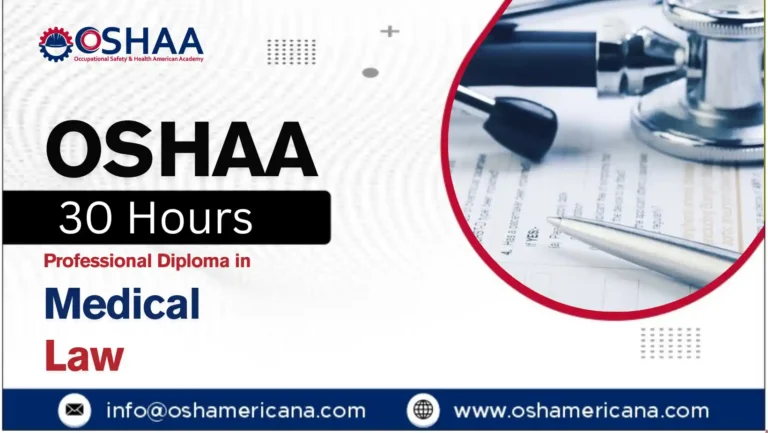The OSHAA 30 Hour Professional Diploma in Airport Management is a specialized qualification designed for individuals seeking to build a strong foundation in the dynamic field of aviation and airport operations. This professional diploma equips learners with the essential knowledge and practical skills required to manage modern airports efficiently, while ensuring compliance with international safety, security, and regulatory standards.
Covering a wide range of critical topics, the program emphasizes airport operations, aviation safety, passenger services, emergency response planning, and regulatory compliance. Learners gain insights into the complexities of airport management, from ground handling and terminal operations to risk assessment and crisis management. By combining theoretical knowledge with practical applications, the diploma prepares participants to handle the challenges of today’s fast-paced aviation industry.
The 30-hour structured curriculum is ideal for aspiring aviation professionals, airport staff, and management trainees who want to advance their careers in the global aviation sector. It also serves as a valuable qualification for those already working in the industry who wish to enhance their expertise and credibility.
Graduates of this program are well-positioned for roles such as airport operations manager, aviation safety officer, compliance specialist, and passenger service supervisor. With the aviation industry continuing to expand worldwide, the demand for skilled airport management professionals is higher than ever.
By enrolling in the OSHAA 30 Hour Professional Diploma in Airport Management, learners not only gain a recognized qualification but also open doors to exciting career opportunities in one of the most vital and fast-growing sectors of global transportation.
OSHAA 30 Hour Professional Diploma in Airport Management
Study Units
Learning Outcomes
Introduction to Airport Management & Global Aviation Industry (3 Hours)
- Understand the structure and functions of the global aviation industry.
- Identify the roles of ICAO, IATA, and other international aviation bodies.
- Explain the classification of airports and their operational categories.
- Recognize the economic and social impact of airports on global connectivity.
- Describe the evolution and trends shaping modern airport management.
- Differentiate between aeronautical and non-aeronautical airport services.
- Assess the importance of regulatory frameworks in global aviation.
- Relate airport management practices to international standards.
Airport Operations & Terminal Management (3 Hours)
- Explain the key functions of airport terminal operations.
- Manage passenger flow, check-in, and boarding processes effectively.
- Understand baggage handling systems and their operational challenges.
- Identify the roles of ground handling service providers.
- Apply best practices in terminal safety and efficiency.
- Evaluate the importance of technology in airport operations.
- Recognize the interdependence of airside and landside operations.
- Develop strategies to enhance operational efficiency in terminals.
Aviation Safety & OSHAA Standards (3 Hours)
- Define occupational safety principles in the aviation context.
- Apply OSHAA standards to airport and aviation operations.
- Identify workplace hazards and implement risk control measures.
- Understand safety management systems (SMS) in aviation.
- Demonstrate compliance with international safety regulations.
- Recognize the importance of safety culture in airport environments.
- Conduct basic safety audits and inspections.
- Evaluate the impact of safety compliance on operational performance.
Airport Security & Regulatory Compliance (3 Hours)
- Understand ICAO Annex 17 and its application to airport security.
- Identify key security threats and vulnerabilities in airports.
- Apply access control and passenger screening procedures.
- Recognize the role of national and international security agencies.
- Implement security protocols for baggage and cargo handling.
- Develop emergency response strategies for security incidents.
- Ensure compliance with aviation security regulations.
- Evaluate the effectiveness of airport security systems.
Airside Operations & Ground Handling (3 Hours)
- Explain the functions of airside operations in airport management.
- Identify safety requirements for runway and taxiway operations.
- Understand apron management and aircraft turnaround procedures.
- Apply safety protocols in fueling, catering, and maintenance.
- Coordinate ground handling services for efficient operations.
- Recognize the importance of communication in airside safety.
- Evaluate the impact of ground handling on flight punctuality.
- Develop strategies to minimize risks in airside operations.
Emergency Planning & Crisis Management (3 Hours)
- Understand the principles of airport emergency planning.
- Identify types of emergencies (fire, medical, security, natural disasters).
- Develop contingency plans for airport crisis situations.
- Apply ICAO guidelines for emergency preparedness.
- Coordinate with emergency response agencies effectively.
- Conduct risk assessments for potential crisis scenarios.
- Implement communication strategies during emergencies.
- Evaluate post-crisis recovery and lessons learned.
Passenger Services & Customer Experience (3 Hours)
- Recognize the importance of customer service in airport management.
- Apply strategies to improve passenger satisfaction.
- Understand accessibility requirements for diverse passenger groups.
- Manage complaints and service recovery effectively.
- Implement cultural sensitivity in passenger interactions.
- Evaluate the role of technology in enhancing passenger experience.
- Develop service quality benchmarks for airport operations.
- Promote a customer-centric culture within airport staff.
Airport Finance & Commercial Management (3 Hours)
- Understand the financial structure of airport operations.
- Differentiate between aeronautical and non-aeronautical revenue streams.
- Apply cost control and budgeting principles in airport management.
- Recognize the role of concessions, retail, and real estate in revenue generation.
- Evaluate financial performance indicators for airports.
- Understand the impact of global economic trends on airport finance.
- Develop strategies for sustainable financial growth.
- Apply ethical practices in airport financial management.
Sustainability & Environmental Management (3 Hours)
- Understand the environmental challenges faced by airports.
- Apply principles of sustainable airport development.
- Recognize the importance of carbon reduction initiatives.
- Implement noise management and pollution control measures.
- Evaluate waste management and energy efficiency strategies.
- Understand ICAO’s environmental policies and frameworks.
- Promote green airport initiatives and eco-friendly practices.
- Assess the long-term benefits of sustainability in aviation.
Leadership, Communication & Professional Development (3 Hours)
- Understand the role of leadership in airport management.
- Apply effective communication strategies in multicultural environments.
- Recognize the importance of teamwork and collaboration.
- Develop decision-making and problem-solving skills.
- Apply ethical leadership principles in aviation contexts.
- Understand conflict resolution strategies in workplace settings.
- Promote continuous professional development and lifelong learning.
- Evaluate personal leadership style and career growth opportunities.
Course Benefits – OSHAA 30 Hour Professional Diploma in Airport Management
Globally Recognized Qualification
- Earn a diploma aligned with international aviation and OSHAA standards.
- Gain credibility that is recognized by airports, airlines, and aviation authorities worldwide.
- Enhance your professional profile with a qualification respected in the global job market.
- Demonstrate compliance with ICAO and IATA-aligned frameworks.
- Build trust with employers by showcasing standardized, benchmarked training.
- Position yourself competitively in both domestic and international aviation sectors.
- Strengthen your CV with a qualification that signals professional excellence.
Comprehensive Skill Development
- Acquire knowledge across airport operations, safety, and security management.
- Develop expertise in passenger services, customer experience, and terminal management.
- Gain financial and commercial insights into airport revenue streams and cost control.
- Learn about sustainability practices and environmental management in aviation.
- Build a well-rounded professional profile covering both technical and managerial skills.
- Understand the interconnectedness of airside and landside operations.
- Prepare for diverse roles by mastering multi-disciplinary aviation competencies.
Career Advancement Opportunities
- Qualify for roles such as airport operations manager, aviation safety officer, or compliance specialist.
- Open pathways to supervisory and mid-management positions in aviation.
- Gain a competitive edge in recruitment for airlines, airports, and aviation service providers.
- Strengthen your eligibility for international aviation career opportunities.
- Build a foundation for progression into higher-level aviation diplomas and degrees.
- Enhance your professional credibility for promotions and leadership roles.
- Position yourself as a future-ready aviation professional.
Practical, Industry-Relevant Knowledge
- Learn through a balanced mix of theory and real-world applications.
- Gain insights into day-to-day airport operations and problem-solving.
- Understand how to apply OSHAA safety standards in real scenarios.
- Develop the ability to analyze and respond to operational challenges.
- Engage with case studies and scenario-based learning for practical exposure.
- Acquire skills that can be immediately applied in the workplace.
- Build confidence in handling complex aviation management tasks.
Enhanced Safety & Compliance Competence
- Master the application of OSHAA safety standards in aviation.
- Learn to identify, assess, and mitigate workplace hazards.
- Understand the role of safety management systems (SMS) in airports.
- Gain expertise in regulatory compliance and international safety laws.
- Develop the ability to conduct safety audits and inspections.
- Strengthen your knowledge of risk management and emergency preparedness.
- Become a valuable asset to employers by ensuring safe and compliant operations.
Improved Leadership & Communication Skills
- Build strong team leadership and management abilities.
- Learn effective cross-cultural communication in global aviation environments.
- Develop conflict resolution and negotiation skills.
- Strengthen your ability to motivate and guide diverse teams.
- Gain confidence in decision-making under pressure.
- Understand the importance of ethical leadership in aviation.
- Enhance your professional networking and collaboration skills.
Sustainability & Future-Readiness
- Learn how to implement green airport practices.
- Understand carbon reduction strategies and eco-friendly operations.
- Gain knowledge of noise management and pollution control.
- Explore waste management and energy efficiency initiatives.
- Align with ICAO’s environmental sustainability frameworks.
- Prepare for the aviation industry’s shift toward sustainable growth.
- Position yourself as a future-ready professional in eco-conscious aviation.
Flexible Learning for Professionals
- Complete the program in a structured 30-hour format.
- Balance learning with work and personal commitments.
- Access a curriculum designed for both beginners and professionals.
- Gain valuable skills without the need for long-term study breaks.
- Benefit from a focused, time-efficient training model.
- Learn at a pace that supports practical application alongside study.
- Enjoy a program tailored for career-focused learners.
Boosted Employability & Global Mobility
- Increase your employability in the fast-growing aviation sector.
- Access opportunities across airports, airlines, and aviation service providers.
- Gain a qualification that supports international career mobility.
- Stand out in a competitive job market with specialized airport management skills.
- Build a career that offers global travel and cross-border opportunities.
- Strengthen your profile for aviation consultancy and advisory roles.
- Position yourself for long-term career stability in aviation.
Foundation for Higher-Level Studies
- Use this diploma as a stepping stone to advanced aviation qualifications.
- Progress into Level 4–7 diplomas, bachelor’s, or master’s programs.
- Build academic readiness for specialized aviation management studies.
- Strengthen your eligibility for professional certifications in aviation safety and compliance.
- Gain the confidence to pursue higher-level leadership and strategic roles.
- Establish a lifelong learning pathway in aviation and management.
- Ensure continuous growth in both academic and professional domains.
Following are the target audience:
Aspiring Aviation Professionals
- Individuals seeking to enter the aviation and airport management industry.
- Students who want to build a strong foundation in global airport operations.
- Learners aiming to gain an internationally recognized qualification early in their careers.
- Those interested in exploring diverse career opportunities within aviation.
- Candidates preparing for entry-level roles in airport operations and safety.
- Young professionals looking to specialize in aviation management.
- People motivated to pursue a career in one of the fastest-growing global industries.
Current Airport and Airline Staff
- Employees working in airports who want to enhance their professional skills.
- Ground handling staff aiming to progress into supervisory or management roles.
- Airline employees seeking cross-functional knowledge of airport operations.
- Staff members responsible for passenger services and terminal operations.
- Aviation workers who want to strengthen their safety and compliance expertise.
- Professionals looking to formalize their experience with a recognized diploma.
- Individuals preparing for promotions or leadership responsibilities in aviation.
Safety, Security, and Compliance Officers
- Professionals responsible for implementing OSHAA and ICAO safety standards.
- Security staff aiming to upgrade their knowledge of international compliance.
- Individuals working in risk management and emergency planning.
- Safety officers seeking structured training in airport safety management systems.
- Compliance specialists who want to align with global aviation regulations.
- Professionals tasked with ensuring workplace safety in high-risk environments.
- Staff preparing for advanced certifications in aviation safety and compliance.
Aviation Management Trainees and Supervisors
- Junior managers preparing for mid-level leadership roles in aviation.
- Trainees in airport management programs who need structured, international-level training.
- Supervisors aiming to expand their knowledge of both airside and landside operations.
- Individuals seeking to strengthen their decision-making and leadership skills.
- Professionals looking to transition from operational roles into management.
- Staff members preparing for higher-level aviation diplomas or degrees.
- Learners who want to develop a holistic understanding of airport management.
Career Changers and Industry Entrants
- Professionals from other industries seeking to transition into aviation.
- Individuals interested in exploring new career opportunities in global transport.
- Graduates from business, management, or engineering backgrounds entering aviation.
- Workers seeking a career shift into a high-demand, international sector.
- People motivated to gain a specialized qualification for career reorientation.
- Learners aiming to combine prior skills with aviation-specific expertise.
- Candidates preparing for international mobility and global career opportunities.
Students and Academic Learners
- University and college students pursuing aviation, business, or management studies.
- Learners seeking an additional qualification to complement their academic degree.
- Students preparing for advanced studies in aviation management and safety.
- Individuals aiming to strengthen their academic portfolio with a professional diploma.
- Learners interested in practical, industry-relevant training alongside theory.
- Students seeking to improve employability before entering the job market.
- Those who want to explore aviation as a long-term academic and career pathway.







